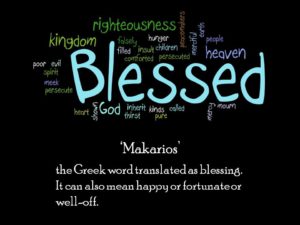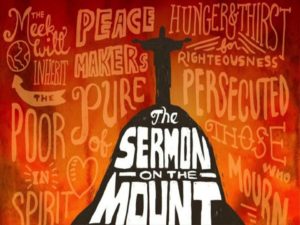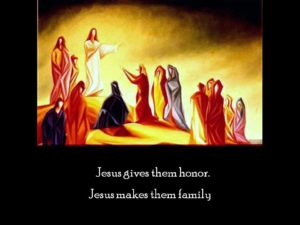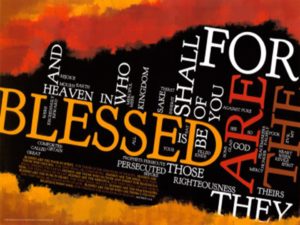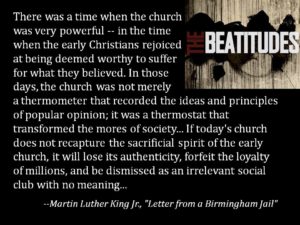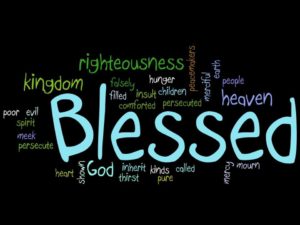In the Beatitudes, Jesus offers formulas for what constitutes blessedness—not good fortune or prosperity or personal achievement, but rather blessed states that we would not typically associate with being blessed. Given our culture’s obsessions with wealth and status, what does it mean for us to hear the people that Jesus considers blessed?
What are blessings? Or another way to ask – what does it mean or even feel like to be blessed? The concept of blessing or being blessed is so much a part of our religious vocabulary that I’m not sure what we are really even talking about when it comes up.
Makarios – the Greek word translated in today’s passage from Matthew as “blessing” – can also mean ‘happy’ or ‘fortunate’ or ‘well-off’.
This feels like a slippery slope – what happens to our sense of blessing when we aren’t feeling happy or fortunate or well-off. What is the source of our blessing in those times that we really don’t feel so blessed?
That may be where Jesus is going as he begins the epic Sermon on the Mount that we hear this morning from the 5th chapter of Matthew. A wide-ranging sermon that covers three full chapters and really lays out Jesus’ teaching, primarily to his newly called disciples, but also to the crowds that have begun to follow with curiosity this new teacher and rabbi.
Up on that mountain, Jesus begins his sermon with 9 statements of blessing – these are commonly known as the Beatitudes – and they are probably pretty familiar to us generally.
In these Beatitudes, Jesus offers formulas for what constitutes blessedness—not good fortune or prosperity or personal achievement, but rather blessed states that we would not typically associate with being blessed – those who are poor in spirit, who are in mourning, who are meek, who are persecuted and reviled.
It is actually a little shocking to hear Jesus make these statements. But Jesus is not playing the role of pop psychologist or prosperity preacher – instead Jesus is declaring and giving honor to those pushed out to the margins of culture and society.
We will remember that the New Testament world is what is called an “honor/shame” society. In this culture, the honor or respect or esteem that you have is in large part in direct relationship to your connections – your family, your extended family, your town – all those with whom you are in relationship. Ultimately, you are only as good as the weakest link in those chains of relationships.
As a result, to decide to follow Jesus – to associate with sinners, to bend the strict rules of the Sabbath, for men and women to be in direct contact with each other outside of the rules that govern those relationships, to leave your father to maintain the family business as those fisherman disciples did.
All of these would have brought shame, not only to those men and women who chose to follow Jesus – but their individual actions and decisions would have brought shame upon their entire families and networks.
Of course, those who had chosen to follow Jesus were not the only ones who found themselves on the outs with their family. Jesus’ words resonated across the mountain that day with all those who were gathered there, all those experiencing a loss of honor in the eyes of others.
To all of them Jesus’ words are full of comfort and hope. And in those words Jesus gives two amazing gifts:
Jesus gives them honor. In front of all the crowds, Jesus declares that, in spite of all the evidence to the contrary, that these are people who have honor in the eyes of God. Their human families may have disowned them, but they are still children of the God who created the universe, the one to whom all honor belongs.
And the second gift, Jesus makes them family. They are children of one Father – members of one family that is connected in profound and powerful ways.
I want us to have a sense of the power of these words of blessing from Jesus – how they would have spoken into the hearts and minds of those 1st century hearers as they listened to this new and radical teaching about God’s blessing.
The question, however, may be, how do we translate these words into our 21st century lives? How do we connect to even a shred of the power of those proclamations of blessing for our lives and for our world?
For us – in the strength we may feel as individuals – or at least in our sense of being independent thinkers, able to act in our own unique ways. For us – today – perhaps we might think of the Beatitudes not just as blessings, but as a call to action.
A call to action that points out just who Jesus really is – a call to action that reminds us, even to our own discomfort, just what the Kingdom of Heaven is all about.
This call to action is for us as the church too – a call to make Jesus present and visible and manifest, especially when the world tries desperately to silence those who speak the truth. Martin Luther King, Jr. sounded these words of warning to the church some 50 years ago, writing:
“There was a time when the church was very powerful — in the time when the early Christians rejoiced at being deemed worthy to suffer for what they believed. In those days, the church was not merely a thermometer that recorded the ideas and principles of popular opinion; it was a thermostat that transformed the mores of society… If today’s church does not recapture the sacrificial spirit of the early church, it will lose its authenticity, forfeit the loyalty of millions, and be dismissed as an irrelevant social club with no meaning…” (Martin Luther King Jr., “Letter from a Birmingham Jail”).
Dr. King naming the inherent danger of not living into the teachings of Jesus – of not heeding the call to follow in the way of the cross – of not responding to the words of Jesus on that mountain.
And these days, we need this reminder – this prophetic call back to be the church – this call to value the people that God values – this call to be those who both recognize the people and circumstances that God calls blessed and to be those who extend blessings to others.
As we look out on our world today, whether it be refugees or immigrants or those on the margins economically or lacking healthcare or the basic necessities needed for life – these words of Jesus call us to value the lives of the most vulnerable in our world.
And so, let us be about blessing, let us respond to this call to action from Jesus to share God’s power to help people persevere and flourish – to share God’s promise of love, honor, and respect.
The beauty of the Beatitudes is that they help move us past the idea that blessings are only about happiness, wealth, fame and power.
And they move us to the reality that to be human is to be broken – to be human is to be vulnerable – to be human is to know loss – and that to be blessed is found when we experience the power and presence of God in those times of brokenness and in the midst of Christian community.
And maybe that’s what it means to be blessed – to draw together as the family of God, seeing each other as God’s beloved children, meeting each other at the points of our brokenness and conveying to each other God’s promises to be with us no matter the circumstance.
And in those words, we are reminded that we are worthy of blessing – that we are worthy because God has named us worthy – that God has called us blessed, that we might be a blessing. Amen.
Rev. John Berg
Gloria Dei Lutheran Church
Northbrook, IL
Authors consulted:
- Sarah Dylan Breuer
- Karoline Lewis
- David Lose
- Alyce McKenzie
Prayers of the People
Creator God, we give you thanks for this day, for this opportunity to worship. We bring to you our triumphs and sorrows, our joys and cares. Hear the voices of your people.
God of love, you have brought us into community with people of every time and place. Open the hearts of all, that we may see our differences as a joyful expression of your never-ending creation. Instill in us a spirit of acceptance and understanding.
Saving God, you have blessed us with life-giving grace through Christ Jesus. We ask that you sustain those who seek to alleviate the pain and suffering of this world. Give strength, courage, wisdom and knowledge to all who work in the field of medicine and use their gifts to be agents of healing. Send your life-giving Spirit so that their ministries may promote health and bring wholeness.
Work to heal the wounds of societies and nations. Guide, protect and strengthen all those who work to build communities and keep them safe. Be with all those who advocate for just economic and social reform. May all promote your love and grace, bringing hope and stability to those who are vulnerable. Lord in your mercy, Hear our prayer.
Healing God, you are the source of all health and well-being. We pray for the children of our communities, especially those who are hungry and in need of life’s basic necessities. Open our eyes to the needs of children around the world, as well as those closest to us, that we might work to keep them safe and whole.
We remember and name before you now, either silently or aloud, all those who are suffering, grieving or who are in need of your protection and care . . . (moment of silence).
Into your hands, eternal God, we offer our prayers, trusting your love; through Jesus Christ our Lord.
Amen.


